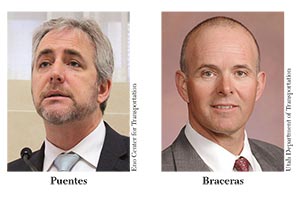Senior Reporter
Experts: New Technology Can Reduce Congestion

This story appears in the May 23 print edition of Transport Topics.
WASHINGTON — Investing in the integration of advanced technologies in cities and freight corridors would help reduce roadway congestion, transportation officials and experts said here during Infrastructure Week.
Introducing self-driving trucks and cars, connecting vehicles’ communication and installing smart sensors on vehicles and roadways will help road-dependent businesses travel safer and quicker, said Robert Puentes, president and CEO of the Eno Center for Transportation, a Washington, D.C., think tank.
“Technology has to service a larger goal, whether it’s safety, or the economy, or the environment. Whatever it is, technology has to get you to a broader objective,” Puentes said at an event his group hosted with the American Association of State Highway and Transportation Officials on May 16.
The Eno Center is analyzing ways urban regions and congested freight corridors may incorporate private capital to improve the performance for roads and bridges, Puentes said, adding that policymakers need to continue to embrace innovative technologies in the transportation network.
For transportation improvements to take off, tech applications need to be carefully applied. “I do think we need to make sure that we reframe the discussion so we’re not just talking about technology for technology’s sake,” Puentes said.
Carlos Braceras, acting director of the Utah Department of Transportation, agreed that policymakers need to embrace a culture of innovation to realize traffic improvements and safer roadways for commercial drivers and motorists.
“We must have an organization that is willing to try and test new things,” Braceras said, “and I think, in the public sector, we’ve done a wonderful job of punishing the states and not doing a good enough job of recognizing those that have taken the risks.”
He added that even outcomes from risks that missed the mark could serve as teachable moments for policymakers.
At a panel hosted by the Association of Equipment Manufacturers on May 17, experts said it is important to use emerging technologies and big data systems to develop smarter streets and corridors.
“The cheapest dollar you’re going to spend on infrastructure is on planning,” said Steve Morrison, Siemens Rail Systems’ director of business development.
Morrison was joined by Amanda Engstrom Eversole of the U.S. Chamber of Commerce’s Center for Advanced Technology. She stressed a need to adopt autonomous vehicles that could potentially reshape infrastructure planning.
A Northwestern University Transportation Center study on the future needs of the country’s transportation infrastructure, commissioned by the Association of Equipment Manufacturers, will be unveiled at a symposium in Evanston, Illinois, on May 23.
Ron De Feo, association director and CEO of Kennametal Inc., a supplier of tooling and industrial materials, previewed the report and said: “It’s so important for our industry to create opportunities and forums that bring together different stakeholders in an effort to craft a vision for a long-term, national plan for U.S. infrastructure and how we will move people, freight and energy in the future.”

